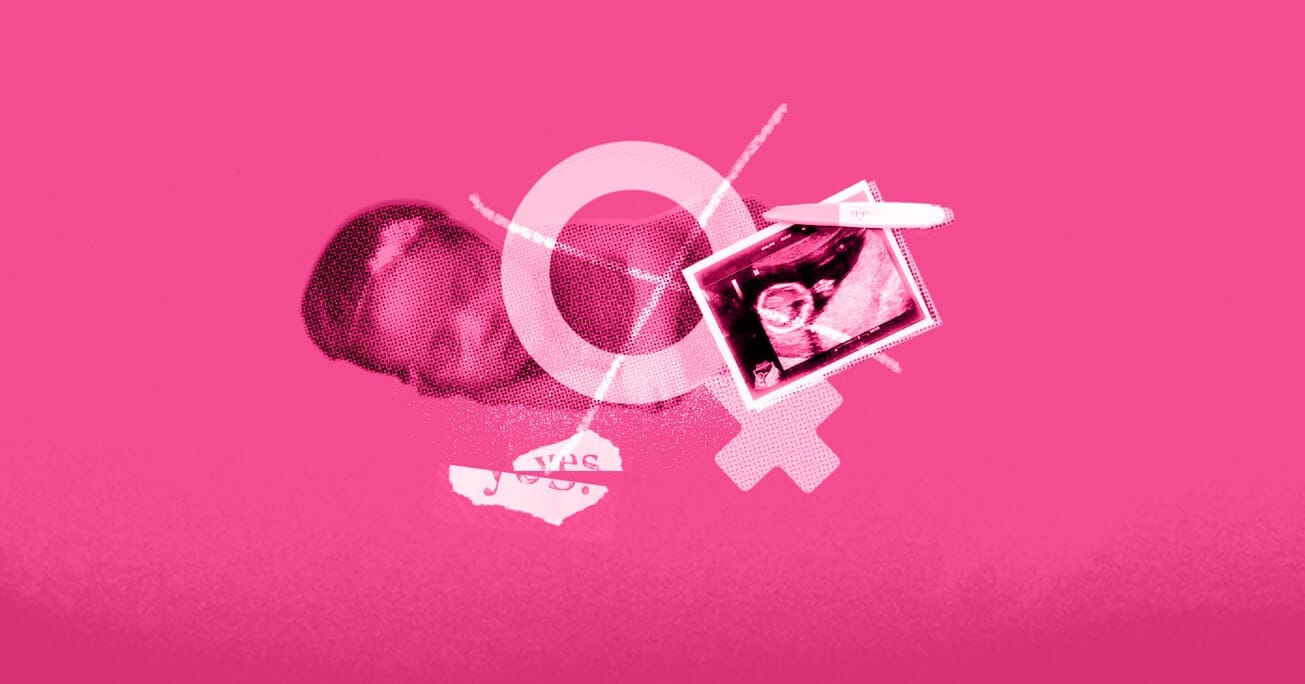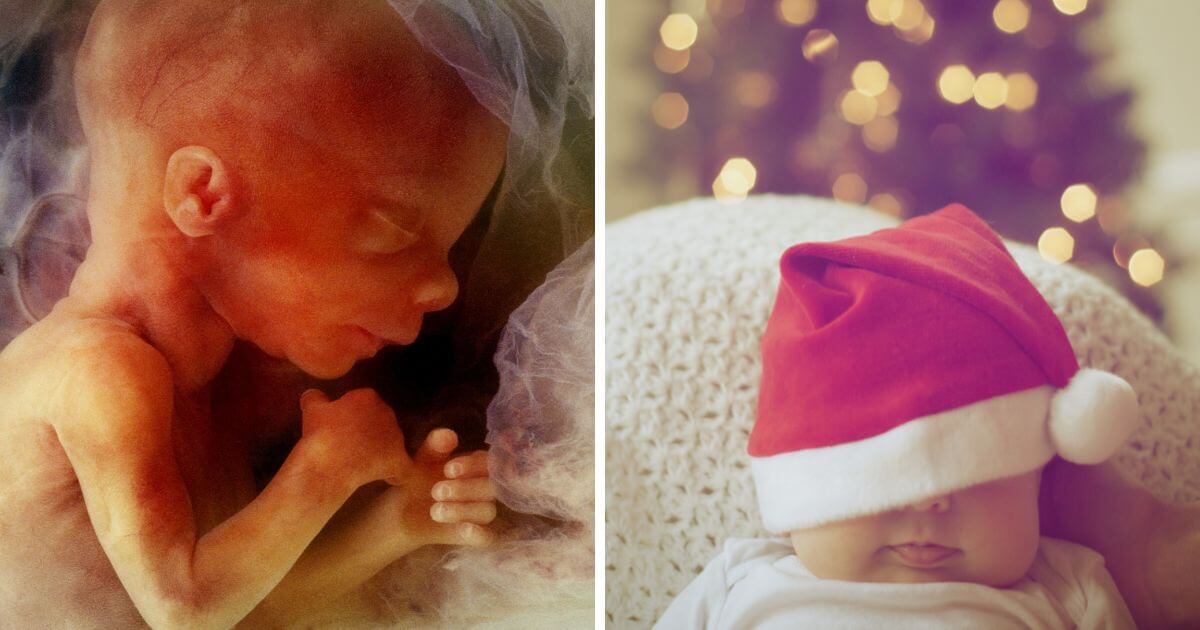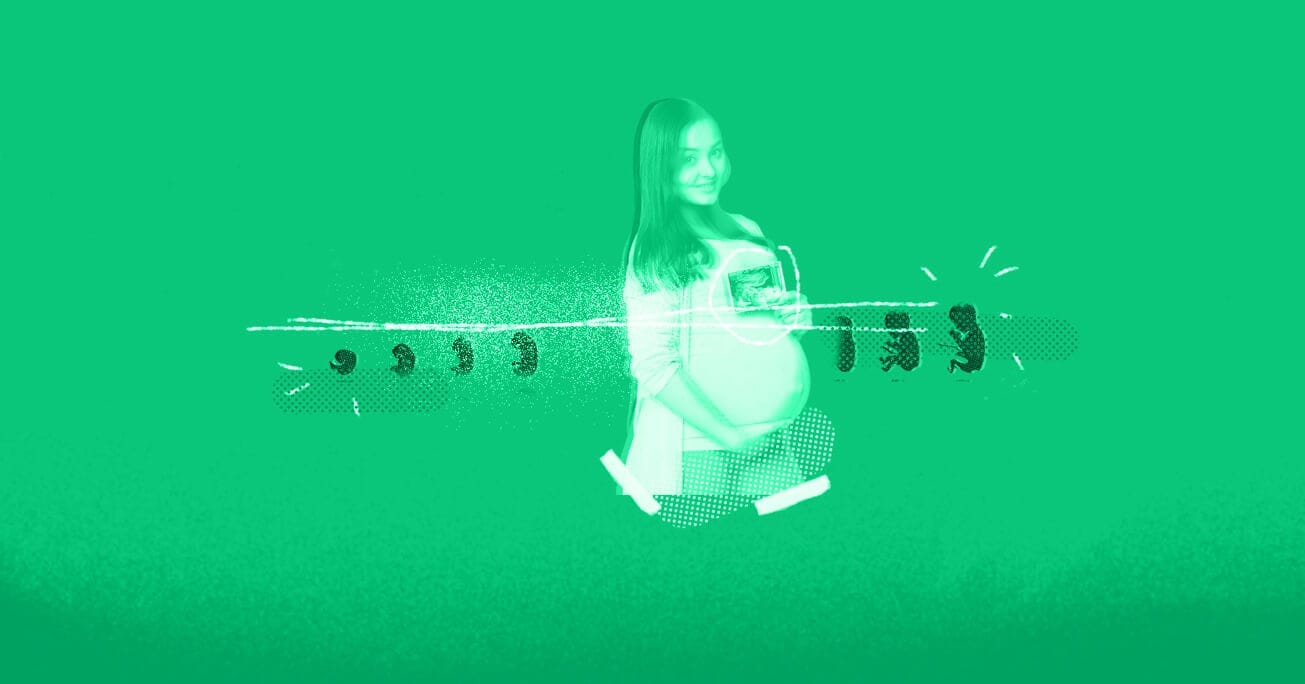In brief
- Sex-selection abortion is the abortion of an unborn baby based on that baby’s sex. It almost exclusively involves the aborting of baby girls.
- The Department of Health and Social Care states that the practice is illegal, however other major stakeholders in the area of abortion provision, including the UK’s largest abortion provider, interpret the law differently, maintaining that sex-selective abortion is legal in the UK.
- There is a growing body of evidence suggesting that sex-selective abortion is occurring in the UK.
- Sex-selective abortion and infanticide have led to a seriously skewed sex ratio in China and parts of India.
- The practice commodifies and devalues women and girls.
What is sex-selective abortion?
In general, a selective abortion is an abortion in which an unborn baby is perceived as having some undesired characteristic and aborted because of this characteristic. This could be almost any characteristic.
- A sex-selective abortion takes place when an unborn baby is aborted because that unborn baby has the undesired characteristic of being the ‘wrong sex’.
- For reasons to be explored below, most often sex-selective abortion involves the abortion of unborn baby girls specifically.
- Female foeticide is a term for the sex-selective abortion of baby girls exclusively. The vast majority of sex-selective abortions are instances of female foeticide.
- A disability-selective abortion takes place when an unborn child is aborted because that child has some kind of disability.
- A selective-reduction abortion takes place when a mother is pregnant with two or more babies, and one or more is aborted to ‘reduce’ the total number born.
Is sex-selective abortion legal in the UK?
The Department of Health maintains that abortion on the grounds of sex alone is illegal in the UK, however other major stakeholders in the area of abortion provision interpret the law differently.
Abortion legislation in the UK is unusual as it does not make abortion legal as such, but rather outlines that if a doctor performs an abortion under certain circumstances, neither the doctor nor the woman having the abortion will be prosecuted.
The Abortion Act 1967 offers various grounds under which it is legal to have an abortion, such as the pregnancy not exceeding the 24th week (unless the child is disabled). But the act does not say that the sex of the child is grounds for an abortion.
However, the law does not say explicitly that sex-selective abortion is illegal. The law is ambiguous and other major stakeholders in the area of abortion provision maintain that sex-selective abortion is legal in the UK.
Ambiguity in the law
- Sex-selective abortion on the grounds of sex-linked disabilities
- Whilst the Department of Health maintains that abortion on the grounds of the sex of the baby alone is illegal, it does say that abortion would be legal on the grounds of some sex-linked diseases (haemophilia, for example).
- Sex-selective abortion on the grounds of mental and/or physical health
- The British Medical Association (BMA) maintains that sex-selective abortion would be legal in cases where the sex of the child could cause physical or mental health problems for the child’s mother.
- The General Medical Council (GMC) has also confirmed that its understanding of the Abortion Act is that fetal gender could be a contributing factor in determining that one of the lawful grounds for abortion has been met.
- The British Pregnancy Advisory Service (BPAS), Britain’s largest independent abortion provider, also maintains that sex-selective abortion is legal. Ann Furedi, Chief Executive of BPAS has claimed that abortion for gender is not illegal: “Sex-selection, like rape, may not be a ground for an abortion, but there is no legal requirement to deny a woman an abortion if she has a sex preference, providing that the legal grounds are still met”.
Evidence of sex-selective abortion in the UK
Data on the incidence rates of sex-selective abortion are limited in the UK. Anecdotal evidence suggests that when women have an abortion because their baby is a girl, they simply provide an alternative reason for having an abortion under the existing law.
However, there is a growing body of evidence suggesting that sex-selective abortion is occurring in the UK.
- A BBC investigation in September 2018 revealed evidence that new non-invasive prenatal tests (NIPT) are being used on a widespread basis to determine the sex of babies early in pregnancy and that some women are coming under intense pressure to undergo sex-selective abortions.
- Evidence was strong enough for the Labour Party to call for a ban on using NIPT for determining the baby’s sex in 2018, as a preference for boys in some cultures, and the concept of ‘family balancing’, may have led to an increase in the numbers of abortions of baby girls.
- Also in 2018, Sky News reported fears that “The [NIPT] test can lead to the termination of baby girls due to a preference for boys in some cultures”, and, as Labour MP Naz Shah stated, could force expectant mothers and fathers to adopt methods such as NIPT “to live up to expectations of family members”. She further told the BBC’s Victoria Derbyshire programme “NIPT screenings should be used for their intended purpose, to screen for serious conditions such as Down’s syndrome […] The government needs to look into this exploitative practice and enforce appropriate restrictions”.
- A 2017 report by the Nuffield Council on Bioethics (a government advisory body) concluded that there was a “real possibility that permitting NIPT for sex determination in the UK may be encouraging sex selection”. In their view, the risk was high enough to justify calling for a restriction on NIPT.
- The report also found several websites offering baby gender tests for about £170, and The Nuffield Council on Bioethics warned that the increasingly widespread private NIPT testing in the UK could lead to the country becoming a haven for “sex-selective” abortions.
- An undercover Telegraph investigation in 2012 revealed that doctors were agreeing to provide sex-selective abortions, “no questions asked” and uncovered that sex-selective abortions were being offered in the UK, including by a doctor who worked both privately and for the NHS.
- A 2015 Department of Health report on sex-selective abortion detailed the personal testimonies of women who had been coerced into obtaining a sex-selective abortion in the UK by their partner or family.
- In their evidence submitted to the Government, Jeena International (a charity supporting women from ethnic minority communities in the UK) notes how one woman, “A”, “undertook the decision to have an abortion based on gender, not because of domestic violence or duress by any of her in laws or husband, but for various complex cultural reasons both self imposed and community imposed, she thought by giving birth to a boy she would be accepted into the family, she would therefore have a status… A registered at an ante-natal clinic and attended all appointments, when she was 18/19 weeks and went for a private scan at Harley St, as a result of the scan that she was expecting a girl. The next day A booked an appointment to have an abortion, she told a doctor it was because she could not afford to have a baby. Ante-natal clinic called to chase her missed appointment, A informed them that she had miscarried when she was on holiday. A at the age of 29 was again expecting however this time twins she then repeated the cycle of aborting on the basis of gender”.
- Further case studies revealed that some women were forced into abortions, or felt pressured to abort, because their second or third child was a girl.
Public opinion on sex-selective abortion
The vast majority of the public in the UK supports introducing an explicit ban on sex-selective abortion.
- A poll of over 2,000 British adults from Savanta ComRes showed that 91% of women and 89% of the general population agree that gender-selective abortion should be explicitly banned by the law.
Sex-selective abortion internationally
While working as the China bureau chief for Science, journalist Mara Hvistendahl wrote Unnatural Selection: Choosing Boys Over Girls, and the Consequences of a World Full of Men (2011). Based on her findings, she estimates that there are 160 million missing women and girls across the globe. This is mostly due to sex-selective abortion and infanticide.
The problem is most extensive in India and China.
Sex-selective abortion in India
- A 2018 government report found about 63 million women were “missing” from the country’s population. This issue is explored in the documentary film “It’s a girl”.
- India outlawed sex-selective abortion and prenatal sex detection in 1994 in order to try to prevent a further sex imbalance and the associated ills that often accompany it. India has an imbalanced sex ratio with significantly fewer girls being born than boys.
- Census data from 2011 showed there were 914 girls to every 1,000 boys for children up to the age of six, but in some northern states that ratio was as low as 850, according to the United Nations Population Fund (UNFPA).
- A 2019 investigation found not a single girl was born in 132 villages across the Uttarkashi district, in Uttarakhand state in northern India over a three-month period.
- Out of 216 births across dozens of villages in northern India over a three-month period, not a single girl was born.
Sex-selective abortion in China
- China has a skewed sex ratio of 114 males born to every 100 females. (The natural sex ratio is 105 boys to 100 girls). This is at least, in part, the result of sex-selective abortion compounded by the one-child policy.
- There are 34 million more men than women.
- China’s ‘one child policy’ combined with a strong cultural preference for boys are thought to be the causes of this skewed sex ratio.
- Marriage squeeze
- The sex ratio is so imbalanced that there have been media reports outlining that many millions of men are struggling to find a wife. A Chinese professor has even suggested introducing polyandry (the practice of one woman having more than one husband) as a solution to this problem.
- Human rights organisations have found that sex imbalance, caused by sex-selective abortion and infanticide, has led to the trafficking of women from other countries to be used as brides for Chinese men. This has been documented in Myanmar, Cambodia, North Korea, Pakistan and Vietnam.
- Prenatal testing for sex and sex-selective abortion have been illegal in China since 2016.
Sex-selective abortion in Canada
- A 2012 report from the Canadian Medical Association Journal called Canada a “haven” for sex-selective abortion.
- It found that: “Easy access to abortion and advances in prenatal sex determination have combined to make Canada a haven for parents who would terminate female fetuses in favour of having sons, despite overwhelming censure of the practice, economists and bioethics experts say”.
- Canada has one of the most extreme abortion laws in the world allowing abortion throughout all nine months gestation for any reason.
- Bill C-233 was proposed in 2020 in the Canadian Parliament that would outlaw sex-selective abortion.
Sex-selective abortion in Armenia
- Data collected in Armenia in 2010 showed there were 115-120 boys being born for every 100 girls
- According to Professor Tsovinar Harutyunyan, the Assistant Representative of the United Nations Population Fund (UNFPA) in Armenia, “due to [sex-selective abortions] until 2060 93,000 girls will not be born in Armenia which is more than two and a half years of yearly births in Armenia and as a result of this our population will decline by 80,000”.
- She went on: “We [the UNFPA] identified that this phenomenon existed in Armenia. We noticed an imbalance in [the births of] boys and girls”.
Ethical considerations and the consequences of sex-selective abortion
A contradiction at the heart of pro-abortion ideology
- Advocates of abortion often frame the debate in terms of ‘women’s rights’ and the ‘right of women to control their own body’. Sex-selective abortion, however, directly affects women and girls in that it actively targets them for elimination. This is why the countries in which it is most prevalent have a serious sex imbalance.
The commodification of women
- Sex-selective abortion indirectly affects society at large.
- As in China, a serious sex imbalance can create ‘supply-demand’ problems where men are unable to marry because there are not enough women, and the women that remain become a commodity to be bought and sold by the highest bidder.
- Consequently, in many countries where sex-selective abortion is widespread, it has led to the trafficking of women and girls.
The devaluation of women
- Advocates of abortion often frame the debate as an issue of choice. But a choice is not good merely because it is chosen. Some choices are bad choices and society does not permit them, or at least does not encourage them.
- The choice to end the life of a child in the womb because that child is a girl is a bad choice. It reflects a deeply negative attitude towards women and girls.
- For various historical and cultural reasons, there remains a strong preference for sons in some societies and groups. This is especially so when the number of children a couple can have is limited, as under China’s one-child policy.
Opponents of abortion argue that since abortion is wrong in general, abortion on the grounds of the sex of the child is wrong too.
Advocates of abortion have differing positions on sex-selective abortion. Some, like Ann Furedi, the previous head of abortion provider BPAS, support access to sex-selection abortion apparently as an extension of support for abortion generally. Others argue that it is wrong because of the adverse consequences such as the commodification of women and because it distorts the mother-child relationship.






